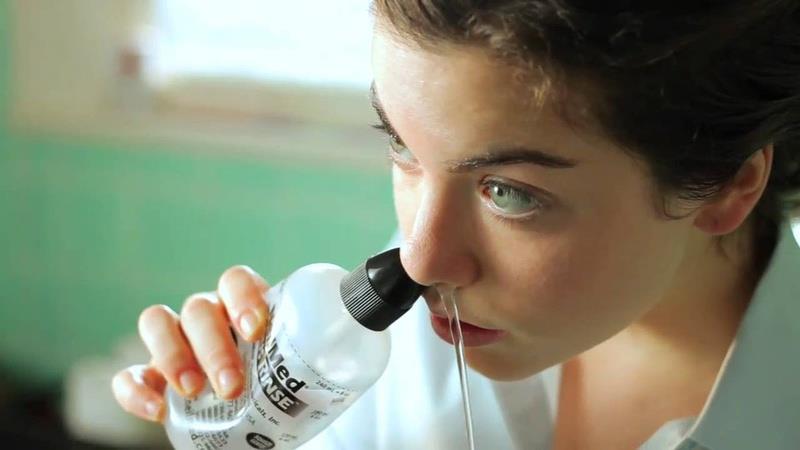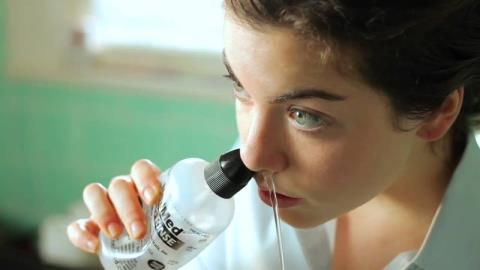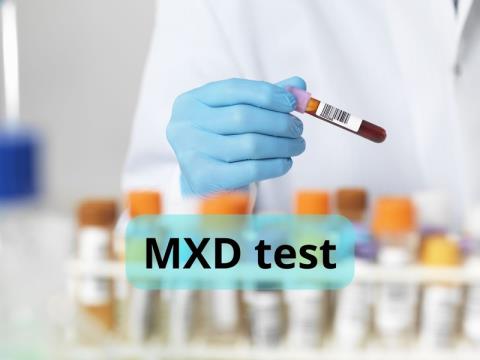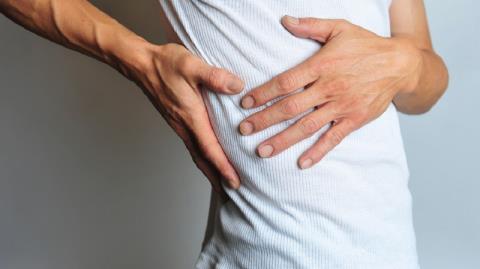Nasal polyps can cause breathing difficulties, headaches, and even decreased sense of smell if the disease is severe. Therefore, finding a way to cure nasal polyps thoroughly is something that every patient wishes to do as quickly as possible.
Nasal polyps are soft, benign tumors that form in the lining of the nose and sinuses. The outside of the nasal polyp is an epithelial layer with columnar cells, square or flat cell wall, inside is an organization associated with fibrous cells forming a loose layer, containing mucus.
Small nasal polyps usually cause few symptoms, mainly causing frequent runny nose, but large polyps can obstruct breathing, making it difficult for patients to breathe and reduce their sense of smell. Even in rare cases, polyps that are too large can change the shape of the patient's face. Therefore, early diagnosis and treatment of nasal polyps will help limit potentially dangerous complications.
People with nasal polyps feel extremely uncomfortable
Diagnosis of nasal polyps
One of the first signs of nasal polyps is a stuffy nose. This symptom gradually increases, causing the patient to have a blocked nose. If polyps appear in both nasal passages, the patient will not be able to breathe through the nose, lose smell, and speak in a closed voice. In addition, a runny nose is also a common symptom of nasal polyps.
In addition to observing the symptoms, doctors can confirm the diagnosis of nasal polyps through:
Nasal examination: In the nasal cavity, there is a soft, smooth, succulent, pale pink tumor, usually in the middle nasal cavity. For a long time, one or more clusters of clusters will appear to fill the nasal cavity, protrude right at the posterior nasal opening, and spread to the arch.
In the case of nasal polyps due to sinusitis, the polyps will be observed around the polyps with a lot of pus, but the polyp face is never necrotic. In addition to the usual polyp, you may experience the following:
- Killian Solitary Polyp: There is only one polyp, which can grow from the middle nasal passage, the nasal bridge or the septum, this case causes a single symptom of stuffy nose.
- Bleeding polyps: often have legs attached to the septum, the area of Kisselbach's vessels, easy to cause bleeding, so it is called hemorrhagic polyp.
- Woakes disease: This type of nasal polyp is present in the ethmoid sinuses on both sides, causing deformity of the main bone of the nose, making the base of the nasolabial wider, the nasolabial folds - the eyes are inflated, the two corners of the eyes are further apart.
How to cure nasal polyps?
How to cure nasal polyps with medicine
Drug treatment of nasal polyps is only applied to mild conditions. Medications you can take in this case are:
- Corticosteroid nasal spray: Works to reduce inflammation, increase airflow through the nose, especially can shrink polyps. Although these drugs have far fewer side effects than oral medications, they can cause nosebleeds, headaches, or sore throats.
- Oral corticosteroids: In some cases, your doctor may prescribe oral corticosteroids, either alone or in combination with a nasal spray. However, be aware that oral steroids can cause serious side effects and should only be taken for no more than a few weeks.
- Anti-allergic and anti-infective drugs: In addition to treating polyps, additional control of allergies and infections is required. Use antihistamines, to combat allergic reactions caused by the body's exposure to the allergen. Antihistamines, although not eliminating nasal polyps, can relieve nasal congestion. In addition, some cases of nasal polyps accompanied by an acute infection in the sinuses require additional antibiotics.
How to treat nasal polyps by taking medicine is only applied when the disease is mild
Surgical treatment of nasal polyps
How to treat nasal polyps when the disease is severe? In the case of severe nasal polyps and medical treatment of nasal polyps is not effective, the patient needs surgery to remove the polyp. Nasal polyp surgery depends on the number and location of polyps in each specific case. In particular, for cystic fibrosis patients with corticosteroid-resistant nasal polyps, surgery is the only option.
In addition, in some cases of nasal polyposis sinusitis , the patient needs endoscopic sinus surgery, not only to remove the polyp but also to open the part of the sinus where the polyp formed. If the sinuses are congested and inflamed, surgery to expand the sinus cavity is needed.
Measures to prevent nasal polyps
In order not to need to use the above nasal polyp treatments, you need to prevent it now. Some effective ways to prevent nasal polyps include:
- Avoid irritants such as pollution, dust, pollen, etc., as they are the factors that make inflammation worse or irritate the sinuses causing allergies.
- Definitive treatment of asthma or allergies: these diseases easily cause nasal polyps.
- Always remember to keep your nose clean: wash your hands often, prevent bacterial infection by viruses that can cause allergic rhinitis and sinusitis.
- Wash the nose regularly: Cleaning the nose with saline also helps to circulate air in the nose easily, eliminating the agents that cause nasal polyps.
 Regular nasal irrigation helps prevent nasal polyps
Regular nasal irrigation helps prevent nasal polyps
Although nasal polyps are not a life-threatening disease, you should not be subjective, once you have them, immediately apply the above remedies to remove them completely.


 Regular nasal irrigation helps prevent nasal polyps
Regular nasal irrigation helps prevent nasal polyps






